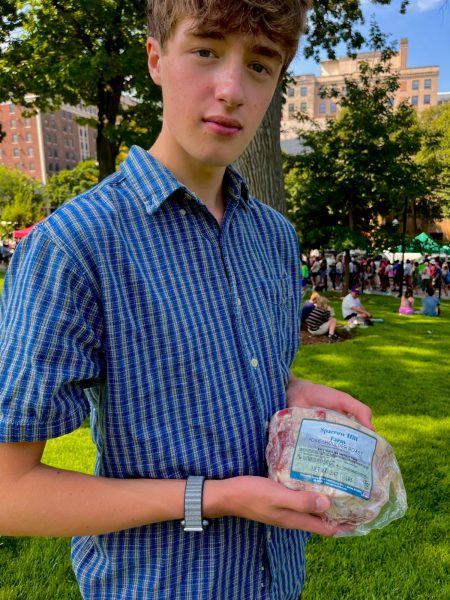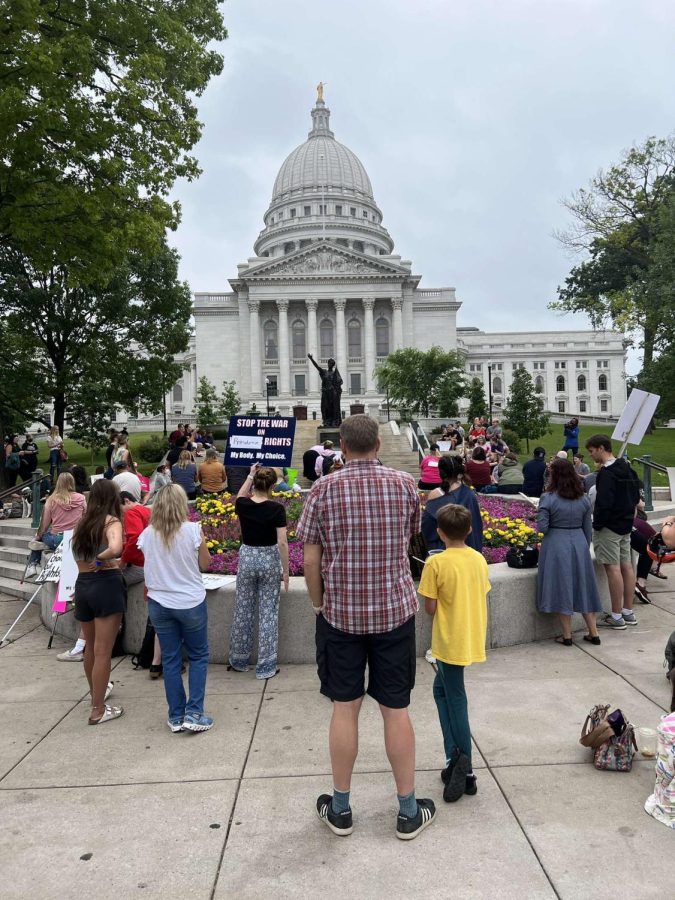Moving Wisconsin Forward
Protesters gather outside the Wisconsin Capitol to protest the overturning of Roe v. Wade in June 2022.
To be politically aware is something that has multiple meanings. It could mean having an opinion on what’s best for our country. It could mean realizing when politicians are being manipulative. It could simply just mean knowing what the word “caucus” means. However we may perceive this, being aware of events that are happening in our country and state are prerequisites for the sake of political involvement and being a citizen.
Three Stoughton High School students who consider themselves to be politically aware are Patrick Lyons, Cassidy Link, and Madison Kenrick. Though all minors and unable to vote, they all have strong opinions on where they feel Wisconsin is and what we could do to make Wisconsin better.
Patrick Lyons is a senior who works with his father as a research assistant at a lobbying firm, allowing him to visit the Wisconsin Capitol during the weekends and to meet with our senators and representatives to gain the knowledge he needs to work in this field.
His political ideals focus on environmental, health- care, and financial issues, and Lyons has beliefs on how all of these problems can be repaired.
“I’d say I’m a moderate Republican, so I’m mostly centrist, but if I had to pick a side, it would be towards the right,” Lyons says.
While he thinks Wisconsin’s political agenda has been decent through the past few years, Lyons believes the timeline is a big issue. He believes that senators and representatives of Wisconsin have been taking a long time to pass legislation lately. This is one of the issues Lyons thinks could be improved upon and fixed by encouraging representatives to have more meetings with voters and their colleagues. On the other hand, he thinks that Tony Evers has been doing a good job in office, with the sole complaint of Evers’ COVID-19 mask mandate in July 2021.
“I found it a little frustrating when they had the mask mandate, pulled it, then brought it back. It just didn’t give a lot of hope towards the future,” Lyons says.
Though Lyons finds issue in these political concerns, he believes the most prominent issue Wisconsin faces is the denial of the right to get an abortion. The current abortion law in Wisconsin is based on legislation from 1849, which states that a woman cannot get an abortion, with no exceptions, except if the mother’s life is in danger. This law even applies in instances of rape or incest.
“I think it’s out of date. I think that with the modern healthcare that we have, women should be able to have abortions if that’s the safe thing to do. No matter if the woman is in danger of having a baby or if she’s had unforeseen circumstances,” Lyons says.
He thinks women have been affected all over the state because they are forced to cross state lines to receive them and because of the risk it may have on a woman’s life.
Lyons is working on getting his voice heard in the government through State representatives and senators. In addition to connections made through his job, he also ensures his voice is heard through protests. He felt that attending protests advocating for a woman’s right to an abortion over the summer of 2022 has also been a good way to be heard.
A Norse Star survey of 81 students showed that only eight percent of SHS students identified as Republicans, while 49 percent of SHS students identified as Democrats. Out of the surveyed students who identify as Republicans, none responded to our interview request. Although here at SHS the number of surveyed Republicans may be low, there are thousands of young Republicans across the country. The High School Republican National Federation is a nationwide organization of high school students across the country that represents thousands of Republican young people. The high school organization has local, state, and national chapters. HSREPS works to unify the broad and diverse makeup of high school Republicans.
HSREPS works to elect politicians who support their platform, which goes hand in hand with the national GOP party platform.
Some of the HSREPS’ main values are protection of life, low taxes, and personal liberty.
“We believe in American citizens being able to keep the money that they earn in a thriving economy. We don’t want to crush the business of our nation and instead allow Americans to grow and prosper,” as stated on the HSREPS official website.
Most of the organizations are seemingly identical to the national Republican Party platform. However, HSREPS works to change the narrative about how high schoolers view the Republican Party and conservatism, as well as advancing and advocating for issues that are most important to young Republicans.
The HSREPS’ website reads, “We believe in the individual liberties of each American through our God-given rights outlined in the constitution and wish to uphold the freedoms of all American citizens. We believe that the right to Life, Liberty, and property should not be impeded upon by an overbearing federal government.”
For decades the GOP has had pro-life values, advocating for the protection of the unborn and ending abortion practices across the country. The HSREPS believes in these values and works to spread their pro-life platform.
“We stand by the fact that every human has the right to life and will uphold that fact against the rise in abortions. We wish to protect those who are unborn and not allow their lives to be cut short. We firmly advocate for pro-life policies and candidates in order to defend the right to life for our weakest,” as stated on the HSREPS website.
Cassidy Link, another senior who considers herself politically aware, thinks people must know what is happening in their state and country. She also thinks it’s essential for citizens to be involved, vote, and fight for what they believe in.
Link’s political values include public education, healthcare, and fair elections, and she recognizes herself as a Democrat. She believes that Republican ideals historically put money over social justice and civil rights, and that concerns her about the opposite party.
Not unlike Lyons, the overturning of Roe v. Wade, or the ban on abortions, is the most significant issue she thinks Wisconsin is facing. However, Link also worries about how politicians interact with their countries and states.
“There are just so many mean people,” she says. “[People], whether they’re men or women or anything in between, [are] calling people names and just really going after the souls of other people in politics.”
Link worries about personal politics, or when politics are focused more on relationships between politicians than the issues they fight for, because the focus is torn away from the issues and instead towards rivalries.
“It should be us against the problem,” Link says.
While Link doesn’t think she is doing anything explicitly to make her voice heard and doesn’t participate in political projects, she feels she does this in more minor, personal ways.
“I’m not afraid to post things on social media. I’m not afraid to bring up conversations with my friends or my family, or people I don’t really know that well. In [government] class, we talk about these things, and I’m not afraid to speak up in those situations,” Link says.
Madison Kenrick, a freshman, believes she has a considerable amount of political knowledge that she uses to follow events happening around the country and state. She consistently follows the news and is aware of protests and movements in her country. She also believes that citizens can make a substantial change by making their voices heard, similar to Link’s belief in involvement.
Kenrick identifies herself as a Democrat but also clarifies that she believes collaboration between the parties is crucial for a respectable government. Women’s rights and public education are two significant issues that matter to her, and she has numerous ideas on how we can expand on and better these issues.
“I think there should be more funding into the schools. I think we should put in more resources and [give teachers a higher salary]. I think [we need to] get the curriculum more into the 21st century. […] We need more resources to help kids to get a better education because I feel like it’s really hard for some students to like the curriculum we have, so [we need to] make it more enjoyable,” Kenrick says.
In addition, she strongly believes that the abortion law needs to be changed.
“I’m a woman. I have women’s rights, […] and I feel like I’m having that ripped away from me. If I’m in a situation where I can’t physically take care of myself, I can’t physically take care of a child. […] I don’t think I should have to carry that child. I feel like the government isn’t understanding of that because it’s run by mostly men,” Kenrick says.
Her belief in women’s rights reflects to her opinion on women’s representation in government. Kenrick feels women’s voices are being put to the side, directly affecting the erosion of women’s rights as a result. From lack of reproductive rights to representation, she feels solutions could be bettered in both areas.
Kenrick shares her hope for a better K-12 schooling system with Lyons and Link. While their values and beliefs are virtually the same around this subject, Lyons thinks that the state can spend the surplus of billions of dollars from the state to raise teacher salaries, and Link feels that bettering the schools at the local level would greatly benefit the system.
While Lyons, Link, and Kenrick may have different political values and focuses, they all generally believe that Wisconsin can and will proceed in the direction that will allow Wisconsin to thrive through its citizens, government, or legislation.
“There’s a lot of bipartisanship on both sides,” Lyons says.
State Representative Jenna Jacobson and State Senator Mark Spreitzer represent Stoughton’s voice in the State House. Both officials are new to their respective offices and to the Stoughton community.
Senator Spreitzer, a Democrat from Beloit, has served as a state representative since 2014 and has been reelected three times. In 2022, Spreitzer launched his campaign for state senate.
“I am proud and grateful to represent the constituents of the 15th Senate District. […] As your State Senator, the most important part of my job is connecting with and serving my constituents,” Spreitzer says on his official state website.
Representative Jacobson, a Democrat, is a resident of the village of Oregon, where she previously served as a village trustee for three terms. Jacobson now serves as state representative for the 43rd assembly district.
Stoughton’s new representatives got to work in early January when they and their colleagues were sworn into office. Democrats and Republicans alike will soon start introducing legislation with hopes of it becoming law. Spreitzer and Jacobson are both ambitious to get to work in the state capitol.
“There’s a lot to focus on. We have a historic state surplus that we need to figure out what to do with, we have a budget to pass, […] and we have a lot of requests from Wisconsinites that we need to be addressing. Things like women’s rights, our environment, [and] our healthcare system. I don’t know which will come first, but I think we need to be tackling all of it,” Jacobson says.
Alongside Jacobson and Spreitzer, the Governor and the entire legislature are working on the early stages of passing a state budget. The state budget is the largest piece of legislation passed through the state legislature every legislative session. The budget funds the state and all of its departments and initiatives for two years.
“We need to work together, especially on the state budget where we have a historic surplus that we need to put to work for the people of Wisconsin,” Spreitzer says.
Although the budget is a current priority among lawmakers, Spreitzer and Jacobson’s work isn’t over once it is passed. Both Spreitzer and Jacobson plan to follow through on big issues highlighted in their campaigns—issues such as ensuring educational opportunities, expanding healthcare access, and supporting family farms and rural communities.
Spreitzer and Jacobson are both advocates for public schools in Wisconsin. Both legislators support increasing funding for K-12 schools and expanding support for mental health resources for students, as well as increased funding for special education programs in Wisconsin.
“We must provide teachers and staff the resources they need to instill in Wisconsin children a life-long love of learning that will carry them forward,” Jacobson says.
Another issue that was prioritized by candidates seeking office this past November is healthcare access and women’s rights. In the state assembly, Spreitzer worked to expand access to quality and affordable healthcare. Spreitzer and Jacobson both support expanding Wisconsin’s low-income healthcare system known as BadgerCare.
Spreitzer and Jacobson have vowed to push for legislation to expand healthcare access in Wisconsin. Both have also come out in opposition to Wisconsin’s 1849 abortion ban.
“I hear your anguish. I feel your rage. As a mother to a daughter and as a daughter with a mother and grandmother who fought for my rights, I am devastated. But, I am also resolved to fight to legalize abortion in Wisconsin,” Jacobson says in a campaign press release.
The communities that Spreitzer and Jacobson represent are home to many farms and smaller rural communities. Both electeds are working on legislation hoping to prioritize resources for farms and support rural communities with policies like the expansion of broadband internet access.
“I’m excited and optimistic heading into the new legislative session. I think that with Governor Evers being reelected, we know that we don’t have to worry about bad legislation becoming law but that we can focus on finding common ground,” Spreitzer says.
Spreitzer and Jacobson have made it clear they are working to represent the best interests of the communities they represent heading into the new legislative session.
“The state has chosen to look forward, to move forward, to work together and find common ground and to no longer be in that politics of resentment and division […] We need to focus on the fact that we are Wisconsinites, and we get things done by working together,” Jacobson says.
Hours after Governor Tony Evers finished his second inaugural address, a wave of Republican criticism emerged. Governor Evers called for signs of cooperation, or at least that’s how Democratic lawmakers and officials saw it.
In the Governor’s second inaugural address, which he made just moments after being sworn into his second term as governor, Evers renewed his calls for many issues, which some top Republicans called “highly-partisan.” Evers highlighted many issues in his address, which he also prioritized on the campaign trail in November. Topics ranged from the legalization of medicinal and recreational marijuana, the legalization of abortion, and expanding the state-run BadgerCare Medicaid program.
“People voted because they believe, as I do, that we should fully fund our public schools. […] People voted because they believe, as I do, that when we deliver tax relief, it should be targeted to the middle class to give working families a little breathing room. […] People voted because they believe, as I do, that we should expand BadgerCare and work to ensure everyone has access to quality, affordable healthcare,” Evers said in his Inaugural address.
The Governor was sworn in his office shortly before 99 members of the State Assembly and 16 members of the State Senate were sworn into their respective offices. Wisconsin’s legislature is currently overwhelmingly composed of Republicans. In the assembly, Republicans hold 64 of 99 seats and 21 of 33 seats in the State Senate. Due to the complex makeup of the state capitol, compromise is key if the Democratic Governor or Republican Legislature wants to pass legislation.
Democrats across the state praised the speech as a so-called “call for common ground.” However, the top two Republicans in the state, Devin LeMahieu—state senate majority leader—and Robin Vos—Speaker of the state assembly, feel as if Evers’ first speech of his new term was anything but that. State Senate Majority Leader Devin LeMahieu, who leads the chamber, cast doubt on the intentions of the governor based on his address. In the past, LeMahieu has been publicly apprehensive or opposed to multiple key policies the governor supported in his speech.
“[He] talked about working together, but all his ideas were highly partisan issues […] so I’m not sure how that is actually working together,” LeMahieu told reporters after the Senate Inauguration ceremony.
State Assembly Speaker Robin Vos also criticized the governor’s address. Vos explained that he, alongside his Republican colleagues, are dedicated to passing a state budget, and that he hopes that Evers will revisit Vos’ key proposals regarding this budget. Vos prioritized continuing to cut taxes for Wisconsin families and businesses, as well as addressing needs in education.
“I think we are trying to focus on things where we can find common ground, and I hope that Evers will revisit what his priorities are so that we can find a way to get things actually accomplished,” Vos said in a press conference shortly after the inauguration.
In his speech, Evers called on the legislature to overturn a state law that bans abortion. Vos and LeMahieu have both opposed such a move. Vos is open to discussing amending the 1849 law to add exceptions for rape and incest, but LeMahieu is unsure whether he’d support legislation adding exceptions for rape and incest.
“We must restore the freedoms that Wisconsinites had until June 23, 2022, the day before the U.S. Supreme Court overturned Roe v. Wade. And I believe that together we will,” Evers said in his inaugural address.
Later in the day, the 2023/2024 legislative session officially began. LeMahieu addressed his senate colleagues, high- lighting the work of the chamber in the past and looking to move forward and called for cooperation and collaboration. LeMahieu hopes that Democrats and Republicans in the chamber will be able to work together.
“A new year and a new legislative session brings with it opportunity. Opportunities to work together to address issues that are faced by all Wisconsinites. […] We look forward to working with the Governor and Assembly to make sure that we not only provide transformational tax relief, but also solutions that benefit the great state of Wisconsin,” LeMahieu says in his inaugural address to the Senate.
Similar to Republican LeMahieu, Democratic Senate Minority Leader Mellissa Agard addressed the senate chamber.
“With Governor Evers’ re-election, I am hopeful all legislators can work together […] continuing to support our local units of government. These are not Democratic values or Republican values—they are Wisconsin values,” Agard says in her inaugural senate address.
Although the day was filled with calls for cooperation and common ground, the sharp political differences within the state painted a weary and uncertain picture of how the officials will work together.

Mylah is a senior, and this is her second and a half year on staff! She's also the editor-in-chief. She joined because she loved the organizational aspect...

Simon is a senior, and this is his third year on staff! He is the publication’s Editor-in-Chief this year! Simon joined the Norse Star his sophomore...






